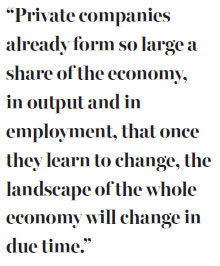No real disagreement on economy

No economist close to the decision-making process is trying to whitewash present difficulties or suggest facile but ineffective fixes
Doing justice to the Chinese economy is hard these days.
Investors like to hear good news. But China has warned since a couple of years ago that news about its business growth won't be as exciting as it used be.
In fact, amid a host of looming uncertainties (and there's no use in blaming uncertainties), keeping a certain level of performance over a sustained period of time - say two to three years or even five years - you have to say China is doing well enough. That's true, although it may still be hard at this point to figure out its many changing details.

Having said this, it seems there are reasons to believe the economy can keep running at an annualized 5-plus percent until it can reach a point where its present problems no longer look as serious and threatening as they are.
The first reason is metaphysical. It is the Chinese attitude. The economy's problem is openly recognized by officials and their policy advisers. No one is saying there are no problems, or that nothing can be done or should be done even though there are problems.
Moreover, that the economy has problems is openly discussed in the media, in the official media, and in media with less or no official background. Throughout the internet, when talking about the economy's problems, people are basically using the same approaches, same terms and even a similar set of priorities.
Yes, there are differences over how much more money, if any, should be spent to help unproductive, state-owned enterprises, and what might be the best way to put to sleep the industrial zombies from the big-smokestack era. But compared with the initial period of China's reform in the agonizing 1980s, or the famous Jefferson-Hamilton debate in the budding stage of the United States, these differences are really nothing.
Behind this is a tacit consensus - among corporate executives from both the private sector and state sector, that simple financial bailout is not the way out, because the whole business environment has changed; the future is going to be very different. Most who are crying for more money are doing so only to campaign for better welfare terms for the workers facing imminent termination of contracts or relocation, or to seek some comfort in the middle of the economy's transition.
No one believes that, with enough government bailout cash, the old industries can smoothly fit themselves into the world's next boom cycle of business.
None of the economists close to the decision-making process is trying to whitewash the present difficulties.
Their candor is interpreted by overseas observers as apparently indicating some internal rift among the leadership. But again, what are the conflicting points among the alleged competing strategies? What can they be?

An article in the official People's Daily in early May, which the outside media has cited many times since, quoted an anonymous "authoritative person" as saying the economy's recovery is going to be L-shaped, meaning that most likely, the present sub-7 percent growth rate would last for the next couple of years at least.
Around two months later, on July 25, another high-level interview, with veteran economist Liu Shijin, now vice-chairman of the China Development Research Foundation, appeared in a not-so-official business paper. Liu says China's future trend line will not only be L-shaped, but the horizontal line of L will also contain many small Ws.
Liu says it will still take one to two more years for China's demand to rebound after hitting bottom. As to when the industry's efficiency will hit bottom, to be marked by a turn in the overall factory-gate price index and acceleration in profit growth, he says he still doesn't know for sure.
The two opinions do not seem to represent two essentially different lines. Nor does there seem any influential voice against them.
The second reason for moderate optimism about China comes from the practical level. As Liu the economist points out, in contrast with the slow change in the formerly state-run heavy industries, the nation's export industry - formed mainly by private companies - is already going through an ugly but truly important phase of change. It is only because private companies are not used to whining about their difficulties that people seldom notice that, in an industry that once was registering from 20 to 30 percent growth but now is reporting negative growth, how many companies must have folded.
More importantly, private companies already form so large a share of the economy, in output and in employment, that once they learn to change, the landscape of the whole economy will change in due time.
The author is an editor-at-large of China Daily. Contact the writer at edzhang@chinadaily.com.cn
(China Daily European Weekly 07/29/2016 page13)
Today's Top News
- Chinese landmark trade corridor handles over 5m TEUs
- China holds first national civil service exam since raising eligibility age cap
- Xi's article on CPC self-reform to be published
- Xi stresses improving long-term mechanisms for cyberspace governance
- Experts share ideas on advancing human rights
- Japan PM's remarks on Taiwan send severely wrong signal






























